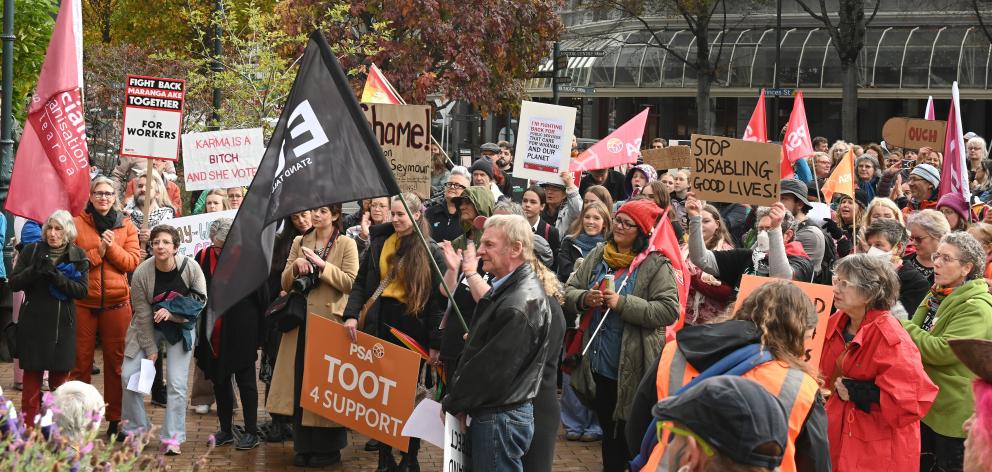Hundreds of protesters braved wet weather in Dunedin to voice their outrage at the government’s changes to the pay equity process.
The Pay Equity Amendment Bill passed on Wednesday after being rushed through under urgency.
Affected workers say they're "angry", "hurt" and "disappointed" and feel betrayed by the architect of the legislation, Workplace Relations and Safety Minister Brooke van Velden, but are determined to keep fighting.
The legislation means 33 equity claims being negotiated will now have to restart the process under new criteria.
Nationwide protests were taking place today.
In Dunedin, members from unions across a variety of sectors including Etu, First Union, the New Zealand Nurses Organisation and the Public Service Union gathered at the Exchange at 1.30pm to stand in solidarity against the overnight amendment to the Equal Pay Act.

She could not believe the Pay Equity Amendment Bill was passed earlier this week.
‘‘I was shocked.’’
The changes were not about equity, but were about making cuts for the upcoming Budget, she argued.
Speakers from unions and Labour MPs Ingrid Leary, the MP for Taieri, and Rachel Brooking, the MP for Dunedin, led chants.
One system to deal with pay equity - PM
It has been revealed the National Party leadership briefed its MPs two days in advance of the announcement to overhaul the pay equity system.
While the party caucus was meeting at 10am on Tuesday - an hour before van Velden revealed the pay equity changes - Prime Minister Christopher Luxon and Finance Minister Nicola Willis considered it significant enough to give its MPs more warning, RNZ has reported.
Speaking to reporters at Parliament yesterday, Willis confirmed the Sunday briefing, saying officials had warned ministers of "legal risks" if the government had talked about its intentions to make changes to pay equity laws ahead of the new legislation being passed.
Luxon told reporters today the reason the government fast-tracked the legislation was to make sure New Zealand has one system to deal with pay equity.
He reiterated that the government was committed to pay equity, collective bargaining, equal pay and pay parity.
"We expect equal pay between men and women doing the same jobs. The next thing is we expect pay parity - people doing the same jobs in different employers or different organisations should be the same.
"Pay equity is an issue where you have women in particular, in female-dominated industries, looking to the value of the work that they do is akin to value that might be a different job done in a different industry or a different sector."
There was nothing to stop anyone making a pay equity claim under the new legislation, Luxon said.

Minister 'doesn't care about women'
Today's protests were organised by the Public Service Association and included a demonstration outside van Velden's Tāmaki electorate office in Auckland.
The government said the changes - which raise the threshold for proving work has been historically undervalued to support a claim - are necessary to make the law more "fair". The new law will also "significantly reduce costs for the Crown."
Support worker Kate Halsell told RNZ she's "really angry," "let down" and "disappointed" by the law change.
"We were so close to getting to the end and getting this sorted, and then to be basically kicked in the guts and told you're going to be starting again, you're not worth anything."
Halsell said the Minister behind the changes "doesn't care about any woman. Doesn't matter the job, she doesn't care".
She was frustrated people don't "see what we do".
"I don't see them going out there and holding the hands of people who are dying, giving them their last respect so they can be at home.
"I don't see them going into a house where a guy who's just become a paraplegic or a tetraplegic, and they're angry and they're upset, and they finally got home, and the reality of life really hits in - we deal with that.
"We walk in and make sure, hey, you're washed, you're dressed, you had your medication, you got your food."
Halsell said achieving pay equity would have made a material difference.
"It means better food on the table. I can have heat in my house 24/7. I can actually get my car fixed properly. I can buy a new car."
She would have been protesting today "with bells on", but had to work.
The nurses' union had at least 10 pay equity claims in play this year.
Registered nurse Andrea Burton was also "disappointed" and "angry", but most of all, she said, "I felt sad."
Burton said it felt like a "betrayal" that it was a woman who made the decision, referencing the Minister van Velden, a member of the Act party.
The thought of having to start the whole claim process over again was "wearing" but the fight will continue, she said.
"Of course, we're all willing to continue to fight. We're not going to let her keep us down. We've done it before. We'll do it again."
- additional reporting by RNZ












